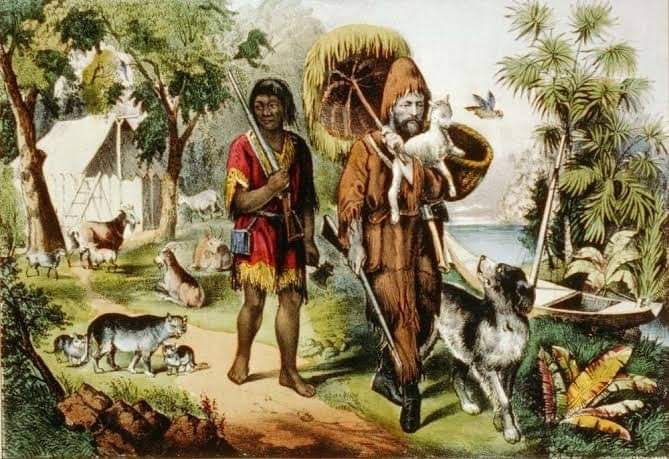"Robinson Crusoe," authored by Daniel Defoe and first published in 1719, is a seminal work in the realistic fiction genre and a profound narrative of adventure, survival, and human resilience.
"Robinson Crusoe," authored by Daniel Defoe and first published in 1719, is a seminal work in the realistic fiction genre and a profound narrative of adventure, survival, and human resilience. The story unfolds with Robinson Crusoe defying his father's advice to embark on a perilous sea voyage, a decision that leads to a series of misfortunes including shipwrecks, encounters with pirates, and ultimately a disastrous expedition in 1651 that strands him on a deserted island off the African coast.
Crusoe survives the wreck and salvages supplies from the ship, setting the stage for a remarkable tale of human ingenuity and endurance. Alone on the island, he constructs a habitation, secures food, and overcomes myriad challenges through sheer will and resourcefulness. As he masters his environment, Crusoe also faces profound isolation, prompting deep reflections on his life and faith, and leading to spiritual and personal growth.
The narrative takes a significant turn when Crusoe discovers he is not alone; the island is occasionally visited by cannibals. His fear turns into action as he fortifies his abode and eventually rescues a captive from the cannibals, naming him Friday. This marks the beginning of a transformative relationship. Crusoe teaches Friday English and introduces him to European ways, while learning to overcome his own deep-seated prejudices and appreciating the value of human companionship.
The bond they forge is pivotal, reshaping Crusoe’s understanding of society and humanity. After nearly three decades of isolation, Crusoe and Friday are rescued by a passing ship. Crusoe returns to civilization, profoundly changed, enriched by the undeniable power of human spirit and hope.
"Robinson Crusoe" endures as a testament to the strength and adaptability of humans, exploring themes of self-reliance, survival, and the crucial human connections that define us. It is not just a tale of adventure but a reflection on the capacity for human endurance and the redemptive power of friendship.


